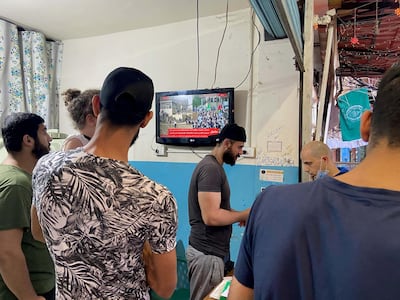It is just 233 kilometres from Al Aqsa Mosque compound in Jerusalem to the Shatila refugee camp on the edge of Beirut, and for the past week the escalating violence in the holy city has been the only thing on people’s minds.
In the Palestinian refugee camp, there are few signs of the covid-19 pandemic – no masks or social distancing. Instead, its residents are preoccupied with Jerusalem.
“I cannot describe the feeling, but I wish I was with them on the ground,” says Wassim Abu Hazina, 30, who works as a media official for the camp in southern Beirut.
These Palestinians, the families and descendants who were forced from their homes in the 1948 formation of the Israeli state in an event known as the Nakba – catastrophe – are denied the right of return and must watch from afar, like thousands of other Palestinians around the region.
Since last week, tension has escalated, as violence has gripped Jerusalem following Israeli efforts to evict scores of Palestinian families from the Sheikh Jarrah neighbourhood in East Jerusalem.
On Monday, Israeli police stormed the Al Aqsa Mosque compound and more than over 720 Palestinians were injured.
Sadly familiar with tragedy and violence, the cafes and barbershops of Shatila camp blast out 24-hour news coverage of Jerusalem.
Young Palestinians, most of whom have never known life outside Lebanon, are fixated on news tickers as updates roll in of an escalation.
Hamas, the militant movement that controls Gaza, claims an Israeli air strike has killed 20 people, including nine children.

The footage of Israeli police firing tear gas into Al Aqsa Mosque – the third holiest site in Islam – rolls through countless repeats, as Abu Hazina watches on with his infant daughter.
Like many others, he says he dreams of being on the ground to defend the shrine from what he calls an invasion.
“People there are my brothers, we have a shared destiny”, he says.
“When they get hurt, I get affected psychologically. What’s happening with the Palestinian people inside Palestine is happening to me personally as a Palestinian refugee living in Lebanon.”
In 1982, an Israeli-backed Christian militia Kataeb – also known as Phalange – entered the camp and massacred at least 1,200 civilians as Israeli soldiers stood watch.
The event brought Shatila dark infamy, not just in the history of the Lebanese civil war, but globally.
“It was a massacre here, and there it is a massacre too. It’s ethnic cleansing,” says Mohammed Afifi, a 55-year-old shopkeeper.
“We are dying here 100 times a day. Every time we watch the news, we are dying.”
Even the long-stalled peace process started by the Oslo Accords in 1993 has yielded little change for those displaced.
“We agreed to live with them [Israel] in Oslo. What was the result? They haven’t left us a chair to sit on,” he says, his voice cracking with emotion.
The frustration and anger are a testament to the power of Jerusalem – murals of the city, and Al Aqsa Mosque are plastered across the walls of the camp.
It is also a mark of despondence for a community trapped in legal limbo for more than 70 years – unable to return, yet never allowed to fully integrate into Lebanon.
In recent days, sporadic demonstrations have sprung up throughout the camp, late into the night revolutionary songs bounce through the camp's narrows streets.

Abu Hazina travels to Downtown Beirut to protest outside the walls of the camp.
Similar demonstrations have been held in cities across the Middle East, from Istanbul to Amman and Ramallah.
Since 2019, young Lebanese activists have grasped peaceful protests as a release for their own despairing situation amid a dire economic crisis.
Today, outside Martyrs’ Square in Downtown, they are turning that attention and rage to the situation at Al Aqsa, 233km south across a heavily fortified and closed border.
“For now, we have nothing to do but sing,” says a young woman called Maryam.








